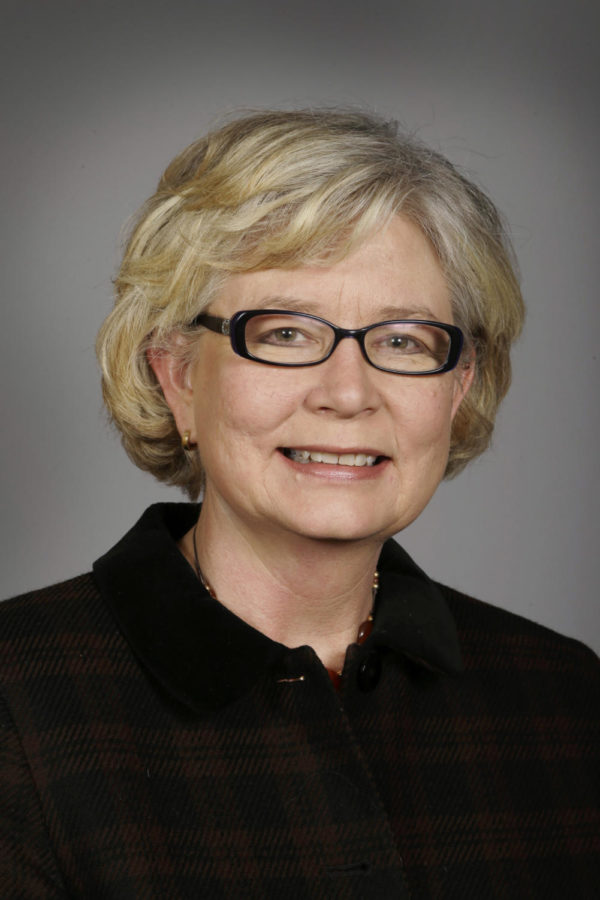- App Content
- App Content / News
- News
- News / Politics And Administration
- News / Politics And Administration / State
Meet the candidate: Democrat Beth Wessel-Kroeschell for the 45th Iowa House District
State Rep. Beth Wessel-Kroeschell, D-Ames, at the Statehouse in Des Moines, Iowa.
October 3, 2018
Beth Wessel-Kroeschell has a long history of representing the people of Ames and is looking to serve a potential eighth term in the Iowa House of Representatives.
With more than 13 years of experience as a legislator, she tries to “keep pace with the pulse of the district” — the district in which she graduated high school, completed her graduate degree and raised her family. While growing up, Wessel-Kroeschell became interested in politics. Her father was a political science professor at Iowa State and her family constantly talked about controversial subjects.
“Family discussions around the dinner table were loud. Then they quieted down for ‘All Things Considered,’” Wessel-Kroeschell said.
During this time, Wessel-Kroeschell began forming her own political beliefs. Today, these include the idea that healthcare should be more affordable, especially for those with pre-existing conditions. To her, this is not a purely political matter. Wessel-Kroeschell and her son are affected by a problem with skin pigmentation that increases the likelihood of cancer.
“There are so many people who are losing their healthcare right now,” Wessel-Kroeschell said. “…There is no regulation whatsoever and pre-existing conditions go out the door.”
Wessel-Kroeschell and some of her Democratic colleagues point to SF 2349. This bill allows certain agricultural nonprofits and other “associations of employees” to set up health benefits plans which are exempted from regulation by the Iowa Insurance Division. Although widely supported on the Republican side, this bill also received support from a considerable amount of Democrats, receiving 69 ‘yes’ votes and 30 ‘no’ votes in a state house that was often closely divided by partisan lines.
“SF 2349 created a legal loophole for Farm Bureau to offer health plans to Iowans that are not compliant with the ACA,” Wessel-Kroeschell said, “and allows Farm Bureau to offer health plans that cannot guarantee health coverage to all members and are able to deny Iowans health coverage based on a pre-existing condition … When individuals with pre-existing conditions are singled out, it puts an added burden on real insurance policies/companies.”
Another issue that is emphasized by the Wessel-Kroeschell campaign is The Board of Regents and Iowa State funding. While her opponent, Ben Brown, considered the education cuts necessary, Wessel-Kroeschell, whose son attends the University of Iowa, actively spoke out against them in debate.
“$50 million was cut to Regents,” Wessel-Kroeschell said. “As a mother of a student, I will be paying more. Every time you went to vote, Regents were cut.”
Education funding is not the only point of distinction between the two candidates. On the issues of voter I.D. and abortion, Wessel-Kroeschell and Brown are on opposites sides of the spectrum as well. Brown supported the “Heartbeat Bill,” which places a ban on abortions after the detection of a fetal heartbeat. Wessel-Kroeschell was an active opponent of the Heartbeat Bill.
Brown also views the voter I.D. laws passed in 2017 as common sense, whereas Wessel-Kroeschell said she believes that voter I.D. laws make voting unnecessarily complicated. Some students, like Iowa State College Democrats President Taylor Blair, have said they oppose the bill. Blair is leading a lawsuit against Iowa Secretary of State Paul Pate over an issue of not being issued a voter I.D. and having his name mixed with someone else in the system.
Members of the student body are not the only ones concerned. Dirk Deam, political science professor at Iowa State, believes the basis for voter I.D. laws is faulty. He said the Republican party is whipping people into a frenzy over the idea of undocumented immigrants voting.
“The Republican party nationally has seized on the idea of voter I.D as supposedly based on voter fraud,” Deam said. “That has been so thoroughly debunked. Voter fraud almost never happens and when it happens it’s as many or more Republicans than Democrats. They don’t want certain people that will be influenced by policy to show up and vote. It makes sense by numbers, but it is morally and civically reprehensible.”
With backlash from Republican policies on the state and national level, many are starting to talk about a potential “blue wave.” It is common for the President’s party to lose seats in off-year elections, but Deam believes that this could be part of a larger political shift.
“We may be sitting on the edge of a generational and demographic change in politics,” Deam said. “The Republican party is very strong if you look at the number of seats in Congress and at the local level, but the Republican party is not well liked by the next generation and is despised by certain demographic groups.”
Despite the partisan divide, Wessel Kroeschell believes that bipartisanship is possible. She knows that some Democrats “want blood,” but still has faith in certain Republican representatives. After the Heartbeat Bill, she said that a bill came up that would have gutted sex-education funding.
“That’s when [moderate Republicans] layed down the law and said they wouldn’t support,” Wessel-Kroeschell said. “They should have done that a lot sooner.”
Wessel-Kroeschell considered it “unusual” that she has not met her opponent yet. Sept. 18, as Brown missed an event at the Ames Public Library for the National Alliance of the Mentally Ill. While Brown apologizes for not making it they hope to meet at the Nevada Public Library at 6:30 p.m. Wednesday.







